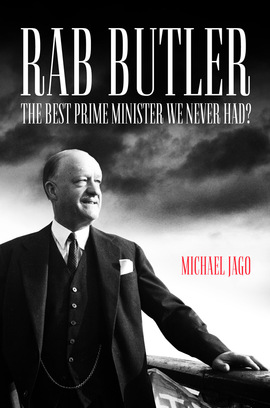 Rab Butler, 1963-64
Rab Butler, 1963-64
Conservative, under Home
You can read about Butler’s early career and his time as chancellor, here; about the period of Suez, his time as home secretary and his failure to become prime minister, here.
The said irony is that Rab Butler had always wanted to be foreign secretary; but that by the time he won the office, he no longer had the fire in his belly for it. He wanted it badly when Macmillan beat him to the leadership; by the time Home was prime minister a second failure to win the highest office had knocked the political stuffing out of him. He was a steady pair of hands, but with an election looming, foreign affairs were hardly paramount. Unlike before, he played little role in the build up to or the campaign for the 1964 election.
 Michael Jago’s recent biography says it plainly: The Best Prime Minister We Never Had? Butler is one of Edward Pearce’s The Lost Leaders. Years later, Home and Macmillan came to believe that the Conservatives might have won in 1964 had he been leader. That assumption is based upon the idea that Butler was more popular in the country than he was in his party. Therein lay the rub. Butler’s moderate, even Baldwinian Toryism sat uneasy with the right of the party. As a reforming home secretary, he alienated the hangers and floggers; his equivocations over Suez reminded many of his days as an arch-appeaser. He could wow conference; the backbenches were unsure.
Michael Jago’s recent biography says it plainly: The Best Prime Minister We Never Had? Butler is one of Edward Pearce’s The Lost Leaders. Years later, Home and Macmillan came to believe that the Conservatives might have won in 1964 had he been leader. That assumption is based upon the idea that Butler was more popular in the country than he was in his party. Therein lay the rub. Butler’s moderate, even Baldwinian Toryism sat uneasy with the right of the party. As a reforming home secretary, he alienated the hangers and floggers; his equivocations over Suez reminded many of his days as an arch-appeaser. He could wow conference; the backbenches were unsure.
Most of all, though, his colleagues were less sure. His ready wit, and his sometimes equivocal support for policies he doubted (especially Suez), aroused suspicions of duplicity. Ironically, the primary beneficiary of those suspicions was the far more duplicitous Macmillan. Butler’s failure to win the top job, twice, perhaps shows that he didn’t quite master the dark arts in the way his rival did. Certainly, it was Macmillan who did more than anyone to deny him both times; more than anyone except Butler, at least. In some ways, Butler’s primary fault was indiscretion, which sometimes looked like deviousness.
 His fundamental decency and grasp of the realities of political life shine through in his memoirs, The Art of the Possible, one of the few examples of its kind worth careful study. He edited and introduced a fine history of the party, The Conservatives. He remains one of only three men since 1906 to have held all three of the great offices of state other than prime minister (like Sir John Simon, never getting the top job). He was one of nine men to have held both the Foreign and Home offices; one of eight to have been foreign secretary and chancellor. He was a significant reforming home secretary. The Butler Act remains the single most important education reform in the 20th century. For Churchill, Eden and Macmillan he was essential to the smooth working of government. If Butler failed, it was a failure of very great substance.
His fundamental decency and grasp of the realities of political life shine through in his memoirs, The Art of the Possible, one of the few examples of its kind worth careful study. He edited and introduced a fine history of the party, The Conservatives. He remains one of only three men since 1906 to have held all three of the great offices of state other than prime minister (like Sir John Simon, never getting the top job). He was one of nine men to have held both the Foreign and Home offices; one of eight to have been foreign secretary and chancellor. He was a significant reforming home secretary. The Butler Act remains the single most important education reform in the 20th century. For Churchill, Eden and Macmillan he was essential to the smooth working of government. If Butler failed, it was a failure of very great substance.